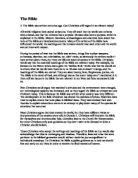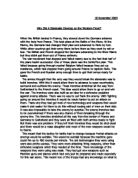Explain what Christians believe about their responsibility for other people.
Mary-Ann Moloku st March, 04 POVERTY AO1: Explain what Christians believe about their responsibility for other people All human beings are born free and equal in dignity and rights. However, there is a difference in the way people live in the world, especially between the Western society and the third world countries. The Western society is more economically developed. They take what they have for granted as it is more materialistic. Rich people do not take note and care about what is happening in third world countries. The main reasons for world poverty are greed, materialism and an uncaring attitude towards other countries problems. In Luke 16:19-31: (The rich man and Lazarus) the rich man had everything and did not share what he had. The poor man had nothing. The rich man, because of his greed, suffered in hell and the poor man had everything he wanted in heaven when he died. In today's society, many of us have chosen to ignore what is happening to the less fortunate people around us and around the world. Even though, we hear of famine, drought, epidemics, war and natural disasters every day on the news, internet or newspapers, some Christians still choose to neglect responsibility for themselves and for others. Some Christians only live for today not for tomorrow. This is further illustrated in Matthew 25:31-46: (The Sheep and the Goats), it states that if you are
Explain why religious people may have problems with transplant surgery.
Explain why religious people may have problems with transplant surgery Transplant surgery involves donation of organs from one person to someone who needs an organ because their organ is malfunctioning or diseased, this enables about 2,700 people to take on a new lease of life in the UK every year. Transplants are the best possible treatment for most people with organ failure. Kidney transplants are the most commonly performed. Transplants of the heart, liver and lungs are also regularly carried out. As medicine advances, other vital organs including the pancreas and small bowel are also being used in transplants. Tissue such as corneas, heart valves, skin and bone can also be donated. People who have died and people alive can donate these organs. The number of living donor kidney transplants has doubled since 1997.Techniques are improving all the time and it may soon be practical to transplant other parts of the body. Transplants save lives, In the UK between 1 April 2002 and 31 March 2003:the highest number of patients for six years received a kidney transplant with living donation now represent one in five of all kidney transplants, A further 2,297 people had their sight restored through a cornea transplant, there was a 52% increase in non-heart beating donation meant that more people than ever received a transplant from these donors, more than 1.2 million people added
Explain why some Christians join communities and take vows of Poverty, Chastity and Obedience.
R.E Course work Msgana Semere Explain why some Christians join communities and take vows of Poverty, Chastity and Obedience. Some Christians join communities and take three vows of poverty, chastity and obedience so they can dedicate them selves to their faith Christianity. Long ago three centuries after the death of Christ to be Christian meant to become a martyr, to die for your beliefs. When Christianity became more acceptable Christians joined together in groups or communities. These Christians were called Hermits because they lived away from civilization; this was the start of the monastic life. These Christians wanted to become perfect Christians so they separated them selves from worldly life. They fell that they are being close to God. Today some Christians chose to become a member of a religious community because it is their vocation. There are two types of religious communities a man or a woman can chose from a contemplative and apostolic. A contemplative order involves being separated form the everyday world and an apostolic community involves around the public, helping the ill, caring for the sick and the old, preaching and teaching. There is a big difference between these communities; to join a Christian would have to be dedicated and ready to become a better Christian and to serve God. A Christian who is part of a religious
War should always be avoided. Do you agree?
war should always be avoided. do you agree? I disagree with the statement that war should always be avoided because war is usually the last resort and is only done after a long amount of thought and consideration. Wars can sometimes be essential for fighting against oppression and unfairness. This means that if a war was not waged then the people who live in the area will continue to suffer and this is not acceptable and hence war can be considered to be a good thing on such grounds and should not be avoided. Followers of Christianity are to defend themselves and go to war it is a just war. Luke 22:36 says "If you don't have a sword, sell your cloak and buy one”. This quote shows that it is important to have a weapon as it can be used to solve issues and problems such as shown in the quote Matthew 21:12-13 “Jesus entered the temple courts and drove out all who were buying and selling there. He overturned the tables of the money changers and the benches of those selling doves” . This shows Jesus using violence to solve an issue for a greater cause and this is exactly why wars are considered to be acceptable as they can be there for the greater good. On the other hand war should always be avoided because there is always other ways to come to an agreement and this is much better than killing innocent people and civilians through the use of WMD’s. Killing is against the
Domestic Violence.
Domestic Violence To determine what the public believed about domestic violence, the Public Policy Research Centre (PPRC) survey of community attitudes used a checklist of possible behaviours which might constitute domestic violence. Almost all respondents said that physical acts such as pushing, shoving, kicking and choking should be classified as domestic violence. A smaller but nonetheless substantial majority thought that smashing an object near one's wife or threatening to hit should be classified as domestic violence. However a clear distinction was evident between physical and other forms of behaviour. Only one quarter of respondents classed denial of money and under half verbal abuse as forms of domestic violence. One in four did not consider that a man frightening his wife could be classified as violence. The second study (ESR, 1988) sought the views of victims and of professionals working with victims on what they considered domestic violence to be. The violence generally mentioned first by these groups was physical - bashing, hitting, punching, kicking, using a knife or a gun. These groups, however, went on to talk about other less obvious but equally damaging, forms of violence, which the ESR report categorises as follows: Psychological, emotional or verbal abuse involving threats, harassment and denigrating the spouse's capacity as a housewife, mother and
Domestic violence
There is a general consensus that official statistics on crime and national victimisation studies, such as the British Crime Survey, do not accurately reflect the incidence of domestic violence. What might be the reasons for this and what can, and is being done, to rectify the situation. Domestic violence was first addressed by the British government in the 19th Century; this was a short-lived concern that did not surface again until the 1960's; the government introduced the Domestic Violence Act in 1976, as a result of this, victim surveys were drawn up in order to calculate the spread and extent of the problem. This essay focuses on a number of interrelating issues concerning our knowledge into the statistics surrounding domestic violence, including the methodology used by the various national victimisation studies, a main example being the British Crime Survey published annually. A key point of this essay is that domestic violence crime statistics should always be approached with a "critical frame of mind" (Maguire (2002) p323); research into this area is still limited as for many years it was seen as a "private, welfare or civil matter" (McLaughlin & Muncie (2001) p118) rather than a criminal one; therefore the statistics presented paint a limited picture of the true extent of domestic violence. These limited statistics are the result of many underlying factors ranging
The Bible was written centuries ago. Can Christians still regard it as relevant today?
The Bible 3. The Bible was written centuries ago. Can Christians still regard it as relevant today? All world religions have sacred scriptures. They all teach that the world and universe were created, and that the universe has a purpose. Humans also have a purpose, which is explained in the Bible. Modern historians, archaeologists and scientists have stated that texts of the Bible are historical documents. Many of the writers of the Bible have influenced the world. Its teachings are that humans should treat each other and the world around them with respect. During the period of time that the Bible was written, things like nuclear weapons, euthanasia, abortion, test-tube babies, etc. didn't exist, so obviously the writers couldn't have written about them, but there are life and death situations in the Bible. Christians would say that the essential teachings of the Bible are relevant today. For example, the Sermon on the Mount where Jesus gave the 'Golden Rule' which was that we should do to others what we would have them do to us. Human nature doesn't change, and the teachings of the Bible are eternal. They are about mercy, love, forgiveness, justice, etc. The Bible is the word of God, and although issues that occur today aren't mentioned in it, there still are issues in the Bible that are relevant in our lives tod from coursework.info ay. Non-Christians could argue that
Why Did A Stalemate Develop on the Western Front?
8 November 2004 Why Did A Stalemate Develop on the Western Front? When the British landed in France, they slowed down the Germans advance with the help from France. This took place at the Battle of the Mons. At the Marne, the Germans had changed their plan and advanced to Paris by foot. While other countrys got their army there before them as they went by rail or taxi. The British and French stopped the Germans advancing to the River Marne but they didnt get them out of France entirerly. The war movement had stopped and failed mainly due to the fact that half of the plans hadnt succeeded. One of these plans was the Schlieffen plan. This failed because going through neutral Belgium failed because they put up resistance, which had stopped them going around France to capture Paris. This gave the French and Russian army enough time to get their armys ready for battle. The armies thought that the only way they would break the stalemate was to build trenches. With this it would allow them to advance to open countryside, surround and outflank the enemy. These trenches stretched all the way from Switzerland to the French coast. This idea would allow them to go on and win the war. The trenches were also built as an idea for a defensive posistion against enemy attacks. There was no way to out flank the enemy. With fighting going on around the trenches it would be made harder to put









